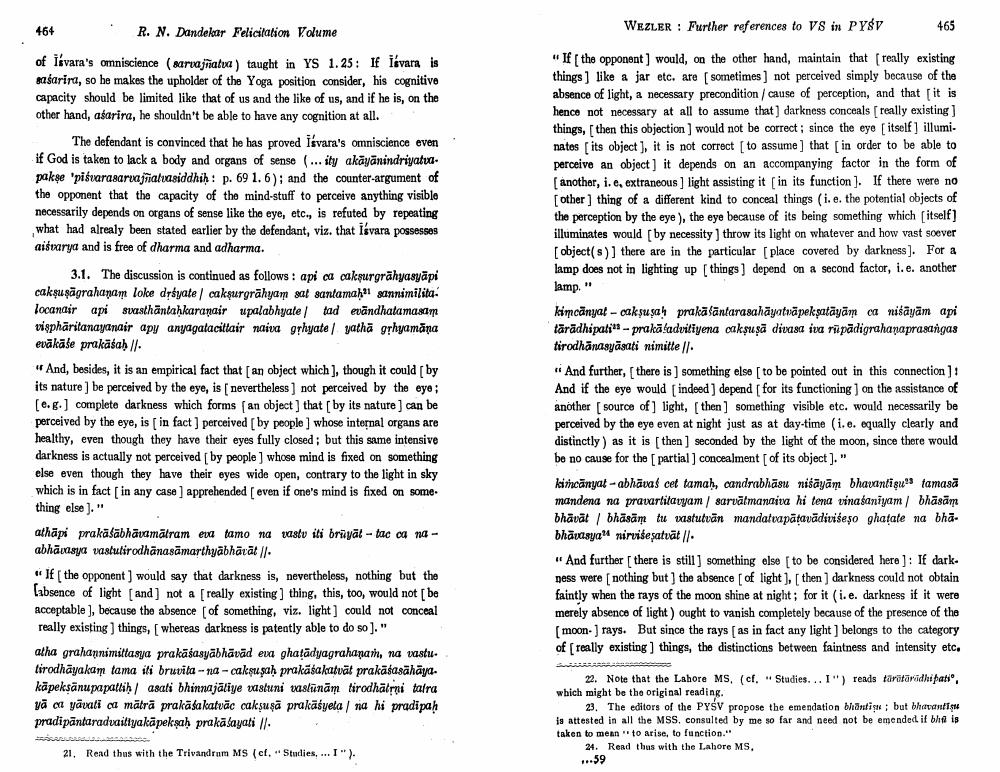Book Title: Further References To Vaisesika Sutra In Patanjala Yogasastra Vivarana Author(s): A Wezler Publisher: A Wezler View full book textPage 5
________________ 464 R. N. Dandekar Felicitation Volume of Isvara's omniscience (sarvajñatva) taught in YS 1.25: If I'vara is sasarira, so he makes the upholder of the Yoga position consider, his cognitive capacity should be limited like that of us and the like of us, and if he is, on the other hand, asarira, he shouldn't be able to have any cognition at all. The defendant is convinced that he has proved Isvara's omniscience even if God is taken to lack a body and organs of sense (... ity akāyānindriyatva. pakṣe 'piśvarasarvajñatvasiddhiḥ: p. 69 1. 6); and the counter-argument of the opponent that the capacity of the mind-stuff to perceive anything visible necessarily depends on organs of sense like the eye, etc., is refuted by repeating what had alrealy been stated earlier by the defendant, viz. that I'vara possesses aiśvarya and is free of dharma and adharma. 3.1. The discussion is continued as follows: api ca cakṣurgrahyasyāpi cakṣuṣāgrahaṇam loke drsyate cakṣurgrahyam sat santamaḥ sannimilita locanair api svasthäntaḥkaranair upalabhyate/ tad evandhatamasam visphäritanayanair apy anyagatacittair naiva grhyate yatha gṛhyamāṇa evākāśe prakāśaḥ ||. "And, besides, it is an empirical fact that [an object which], though it could [by its nature] be perceived by the eye, is [ nevertheless] not perceived by the eye; [e.g.] complete darkness which forms [an object] that [by its nature] can be perceived by the eye, is [ in fact] perceived [by people] whose internal organs are healthy, even though they have their eyes fully closed; but this same intensive darkness is actually not perceived [ by people] whose mind is fixed on something else even though they have their eyes wide open, contrary to the light in sky which is in fact [ in any case] apprehended [ even if one's mind is fixed on some. thing else ]." athāpi prakāśābhāvamatram eva tamo na vastu iti bruyat-tac ca naabhāvasya vastutirodhānasāmarthyābhāvāt ||. "If [the opponent ] would say that darkness is, nevertheless, nothing but the [absence of light [and] not a [really existing] thing, this, too, would not [be acceptable], because the absence [of something, viz. light] could not conceal really existing] things, [whereas darkness is patently able to do so ]." atha grahannimittasya prakāśasyābhāvād eva ghaṭādyagrahanam, na vastu. tirodhāyakam tama iti bruvita-na-cakṣuşaḥ prakasakaṭvāt prakāśasāhāya. kāpekṣānupapattiḥ asati bhinnajaliye vastuni vastunām tirodhatṛṇi talra ya ca yavati ca mātrā prakāśakatvac cakṣuşa prakāśyeta / na hi pradipaḥ pradipantaradvaittyakāpekṣaḥ prakāśayati ||. م 21. Read thus with the Trivandrum MS (cf. "Studies,... I"). WEZLER Further references to VS in PYSV : 465 " If [the opponent] would, on the other hand, maintain that [really existing things] like a jar etc. are [sometimes] not perceived simply because of the absence of light, a necessary precondition / cause of perception, and that [it is hence not necessary at all to assume that] darkness conceals [really existing] things, [then this objection] would not be correct; since the eye [itself] illuminates [its object], it is not correct [to assume] that [in order to be able to perceive an object] it depends on an accompanying factor in the form of [ another, i. e, extraneous ] light assisting it [in its function]. If there were no [other] thing of a different kind to conceal things (i. e. the potential objects of the perception by the eye), the eye because of its being something which [itself] illuminates would [by necessity] throw its light on whatever and how vast soever [object(s)] there are in the particular [place covered by darkness]. For a lamp does not in lighting up [things] depend on a second factor, i. e. another lamp. " kimcanyat - cakṣuṣaḥ prakālāntarasahāyatrāpekṣatāyām ca niśāyām api tārādhipati - prakātadvitiyena cakṣuşă divasa iva rūpādigrahanaprasangas tirodhānasyāsati nimitte II. "And further, [there is ] something else [ to be pointed out in this connection]: And if the eye would [ indeed] depend [for its functioning ] on the assistance of another [source of] light, [then] something visible etc. would necessarily be perceived by the eye even at night just as at day-time (i.e. equally clearly and distinctly) as it is [then] seconded by the light of the moon, since there would be no cause for the [partial] concealment [of its object ]." kimcanyat-abhāvas cet tamaḥ, candrabhāsu niśāyām bhavantīgu tamasā mandena na pravartitavyam | sarvātmanaiva hi tena vinasaniyam bhāsām bhāvāt | bhāsām tu vastutvän mandatvapātavādiviseşo ghatate na bhabhavasya nirvisesatvāt //. "And further [there is still] something else [to be considered here]: If darkness were [nothing but ] the absence [of light ], [ then ] darkness could not obtain faintly when the rays of the moon shine at night; for it (i. e. darkness if it were merely absence of light) ought to vanish completely because of the presence of the [moon-] rays. But since the rays [as in fact any light] belongs to the category of [really existing] things, the distinctions between faintness and intensity etc. 22. Note that the Lahore MS, (cf. " Studies... I") reads tārātārādhipati", which might be the original reading. 23. The editors of the PYSV propose the emendation bhāntisu; but bhavantīņu is attested in all the MSS. consulted by me so far and need not be emended if bh is taken to mean to arise, to function." 24. Read thus with the Lahore MS, ...59Page Navigation
1 ... 3 4 5 6 7 8 9
